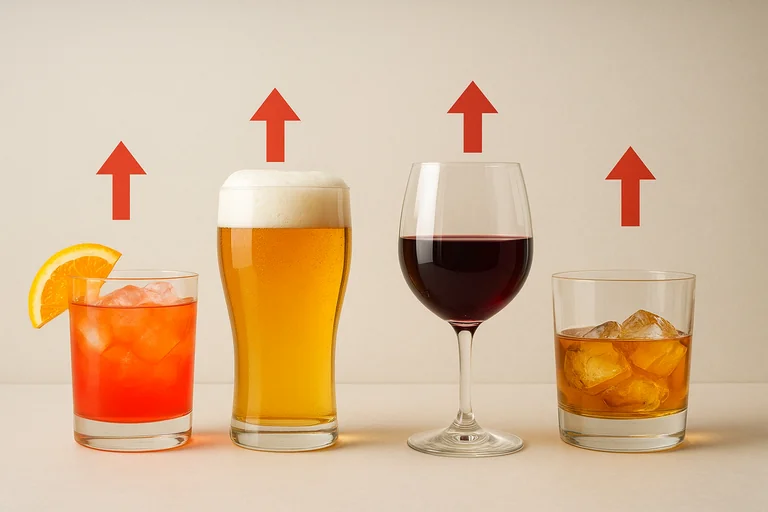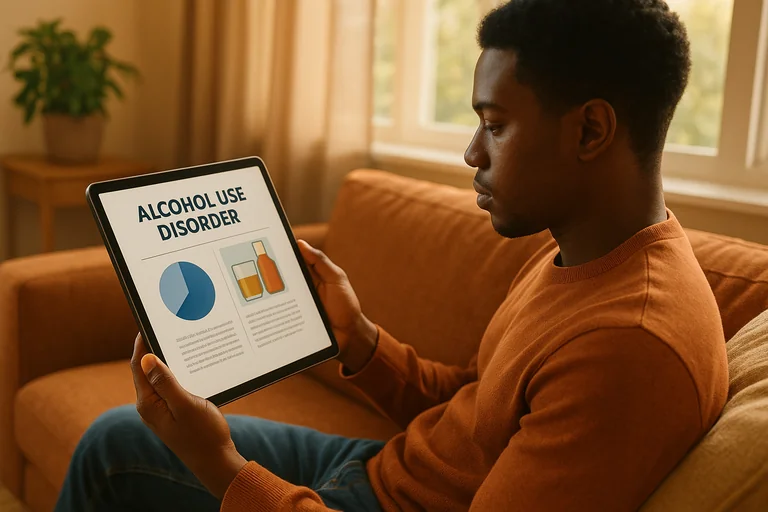A 2 minute assessment to get a personalized mental health or alcohol recovery plan.
You've made the decision. You're done with drinking. You're ready to take back control of your life, and you want to do it now. Your first instinct might be to simply stop, to go "cold turkey." It sounds straightforward, decisive, and strong. But when it comes to alcohol, it can also be incredibly dangerous, and in some cases, even fatal.
What You'll Discover:
- What to do when you want to quit drinking immediately and safely
- Steps to take to avoid dangerous withdrawal complications like seizures and delirium tremens
- The importance of medical supervision when stopping alcohol consumption
The idea of quitting alcohol cold turkey may seem logical to some people, but it's actually been recognized as a dangerous approach for decades. When traditional "just stop drinking" methods fail repeatedly, causing life-threatening medical emergencies, many people assume they can power through withdrawal symptoms with willpower alone. With modern understanding of alcohol withdrawal syndrome, medical detox protocols and other evidence-based approaches now available, it's actually very straightforward to quit alcohol safely without risking your life.
So, how does safe alcohol cessation work exactly? It's actually much more medically complex than you think with your nervous system directly involved.
Do Your Research About Alcohol Withdrawal Syndrome
Before you begin taking steps to quit drinking, it's important to learn about alcohol withdrawal and its potentially life-threatening complications. In particular you want to look up information on:
- How alcohol affects your nervous system and what happens when you stop
- What chronic alcohol consumption does to your brain chemistry
- When withdrawal symptoms require immediate emergency medical intervention
Medical conditions are triggered by different factors, and alcohol withdrawal syndrome is the perfect example. It's not just for people with severe alcohol use disorder who drink large amounts daily. It's also appropriate for people who want to understand why even regular moderate drinking can cause dangerous withdrawal symptoms when stopped abruptly.
No matter what your drinking pattern, it's always best to know as much as you can about withdrawal risks before attempting to quit on your own.
Choose to Get Medical Supervision
The next part takes professional medical support as well. You'll need to determine whether you can safely quit with outpatient medical monitoring or require inpatient detox supervision. This is an extremely important decision that goes well beyond just hoping you'll be able to handle withdrawal symptoms alone.
You'll want to make sure that you understand the signs of dangerous withdrawal complications to ensure you get appropriate medical intervention when needed. Experience with alcohol withdrawal is also extremely important. Healthcare providers who have been managing alcohol detox for years and specialize in addiction medicine are going to be well-equipped to help with safe withdrawal protocols.
Take an Assessment of Your Withdrawal Risk
The medical provider you choose should evaluate your specific risk factors to determine what level of medical supervision you'll need during withdrawal. This is a crucial part of the process for understanding whether outpatient or inpatient detox will be most appropriate for your safety.
This assessment is a simple yet crucial part of the process for determining what type of medical support will be necessary for your situation. It also provides healthcare providers with baseline information that will be important in subsequent steps of the detox process.
Choose the Right Level of Medical Support
If significant withdrawal risk is identified after your assessment you can discuss detox options and develop a plan with your healthcare provider. With evidence-based medical approaches there are several proven protocols that all include different levels of medical supervision and medication support as needed.
Have Your Medical Consultation
The most essential step in safely quitting alcohol is having a thorough evaluation with a healthcare provider who understands alcohol withdrawal syndrome. They will:
- Go over your drinking history and current consumption patterns
- Discuss your previous withdrawal experiences if any
- Listen to your concerns about quitting and withdrawal symptoms
This will help the provider determine what level of medical supervision you'll need and whether immediate detox is recommended. If so, the healthcare provider will go over your options and provide information on safe withdrawal protocols.
Begin Your Medically Supervised Detox
After your medical consultation, you'll start the detox process under appropriate medical supervision. This might include inpatient monitoring, outpatient check-ins, or medication protocols depending on your specific risk level.
The detox process will focus on keeping you safe and comfortable while your body adjusts to functioning without alcohol. It's extremely important to follow medical protocols exactly as prescribed, especially when it comes to medication timing and emergency procedures.
Take the Withdrawal Process Seriously
Once you understand the risks of unsupervised withdrawal you can begin following the safety protocols necessary to protect your health during detox. There will be specific instructions about medication schedules, warning signs to watch for, and when to seek immediate medical help.
It's extremely important to follow these protocols exactly as your healthcare provider recommends, particularly when it comes to recognizing signs of dangerous complications like seizures or delirium tremens.
Follow-Up to Ensure Safe Completion
Having ongoing medical monitoring throughout your detox process is highly beneficial in ensuring you complete withdrawal safely without developing life-threatening complications. It gives you the opportunity to report any concerning symptoms and for your medical plan to be adjusted, if needed.
The provider can also help you transition to long-term recovery support once detox is complete and your withdrawal symptoms have resolved.
Why Your Brain Works Against You When You Stop Drinking
Don't let outdated ideas about quitting alcohol being a matter of willpower fool you into thinking that stopping cold turkey is safe or advisable. The criteria for what makes alcohol withdrawal potentially lethal is well-established based on decades of medical research.
Many emergency physicians, addiction specialists and detox experts will tell you that alcohol withdrawal affects your nervous system in profound and dangerous ways. Even people who don't consider themselves heavy drinkers can experience life-threatening complications, and it's particularly dangerous because chronic alcohol consumption creates physical dependence that makes sudden cessation extremely risky.
Now that you have a better idea of what's happening in your nervous system when you stop drinking abruptly, let's delve further into the specific timeline of withdrawal complications and why medical supervision is essential.
The Undeniable Truth About Cold Turkey Withdrawal
The undeniable truth is that quitting alcohol cold turkey can trigger a cascade of severe and potentially fatal symptoms. According to the Cleveland Clinic, alcohol withdrawal is a common and serious issue, affecting about 50% of people with alcohol use disorder who stop or decrease their drinking.
Your Brain's Dangerous Rebalancing Act
Alcohol is a central nervous system depressant that slows down brain function. To compensate, your brain increases production of stimulating chemicals to maintain balance. When you suddenly remove alcohol, your brain is left in a state of extreme hyperexcitability.
This rebound effect is like a spring that's been compressed for months or years suddenly being released. The resulting nervous system chaos can cause seizures, hallucinations, and other life-threatening complications.
The Critical Timeline of Withdrawal Complications
According to American Addiction Centers, withdrawal symptoms follow a predictable and increasingly dangerous timeline:
6-12 Hours After Last Drink: Initial symptoms begin including anxiety, headache, nausea, sweating, and tremors. For some people, this may be the extent of withdrawal, but for others it's just the beginning.
12-24 Hours After Last Drink: Alcoholic hallucinations may begin. While frightening, these are typically not as severe as what comes next.
24-48 Hours After Last Drink: This is the seizure danger zone. Withdrawal seizures peak during this period and can cause serious injury or death. These seizures are a clear sign that you need immediate emergency medical care.
48-72 Hours After Last Drink: The risk of delirium tremens (DTs) reaches its peak. This medical emergency includes severe confusion, extreme agitation, vivid hallucinations, fever, rapid heart rate, and seizures.
Delirium Tremens: A Medical Emergency
Delirium tremens represents the most severe form of alcohol withdrawal and can be fatal without immediate medical treatment. The mortality rate for untreated DTs can be as high as 35%, but drops to less than 5% with proper medical care.
Symptoms include severe confusion and disorientation, extreme agitation, vivid hallucinations and delusions, high fever and profuse sweating, dangerously rapid heart rate and blood pressure, and potentially fatal seizures.
NEED TO KNOW: Delirium tremens is a life-threatening emergency that requires immediate hospitalization. Anyone experiencing these symptoms needs emergency medical care immediately - do not attempt to manage this at home.
Who Faces the Highest Risk
While anyone can experience withdrawal complications, certain factors dramatically increase your risk of severe symptoms:
- Heavy, frequent drinking: The more you drink and the more often, the higher your risk
- Long-term alcohol use: Years of regular drinking create more severe physical dependence
- Age and health status: Older adults and those with medical conditions face greater risks
- Previous withdrawal history: If you've had withdrawal symptoms before, they're likely to be more severe with each episode
Even people who don't consider themselves "alcoholics" can experience dangerous withdrawal if they've been drinking regularly for extended periods.
The Safe Alternative: Medical Detox
Given the serious risks of cold turkey withdrawal, the only safe approach is medically supervised detox. This process allows you to withdraw from alcohol safely under professional medical care, whether in a hospital, specialized detox facility, or through closely monitored outpatient programs.
During medical detox, healthcare providers may use medications to prevent dangerous complications:
- Benzodiazepines: These medications can prevent seizures, reduce anxiety, and manage other withdrawal symptoms safely
- Other supportive medications: Various medications can address specific symptoms like nausea, blood pressure changes, and sleep disturbances
- 24/7 monitoring: Medical staff can immediately respond to any signs of serious complications
Medical detox isn't just safer - it's also more comfortable, with medications available to significantly reduce the discomfort of withdrawal symptoms.
Beyond Detox: Building Long-Term Recovery
Safely completing detox is just the first step in your recovery journey. Once withdrawal is complete, the real work of building a sober life begins:
- Therapy and counseling: Individual and group therapy help address underlying reasons for drinking and develop healthy coping strategies
- Support groups: Communities like AA provide ongoing support from people who understand your experience
- Medication-assisted treatment: Medications like naltrexone can reduce cravings and help prevent relapse once detox is complete
- Lifestyle changes: Developing new habits, hobbies, and social connections that support sobriety
The combination of safe detox followed by comprehensive recovery support gives you the best chance of long-term success.
The Connection Between Safe Detox and Long-Term Success
Attempting to quit cold turkey isn't just dangerous - it often leads to failure and repeated cycles of drinking and unsuccessful quit attempts. When withdrawal symptoms become unbearable, many people return to drinking just to make the symptoms stop.
Medical detox breaks this cycle by making withdrawal safer and more manageable. When you're not fighting severe symptoms alone, you can focus your energy on the psychological and social aspects of recovery.
Starting your recovery journey safely also builds confidence and momentum that carries forward into long-term sobriety. You'll know that you can handle challenges with proper support rather than trying to tough everything out alone.
Your Life Is Worth Professional Help
Quitting alcohol is one of the most important decisions you can make for your health and future. The desire to stop immediately shows tremendous motivation and commitment to change.
However, that same commitment to your wellbeing should lead you to choose the safest possible approach. Your life and health are too valuable to risk with dangerous cold turkey withdrawal.
Professional medical support isn't a sign of weakness - it's the smart, responsible choice that gives you the best chance of successfully achieving your goal of sobriety.
Don't let the urgency to quit immediately put your safety at risk. With proper medical supervision, you can begin your recovery journey right away while protecting yourself from potentially fatal complications.
If you're determined to quit drinking and want to do it safely, professional support is available to help you start immediately. Take our Alcohol Use Assessment to connect with medical professionals who can help you quit safely today.




